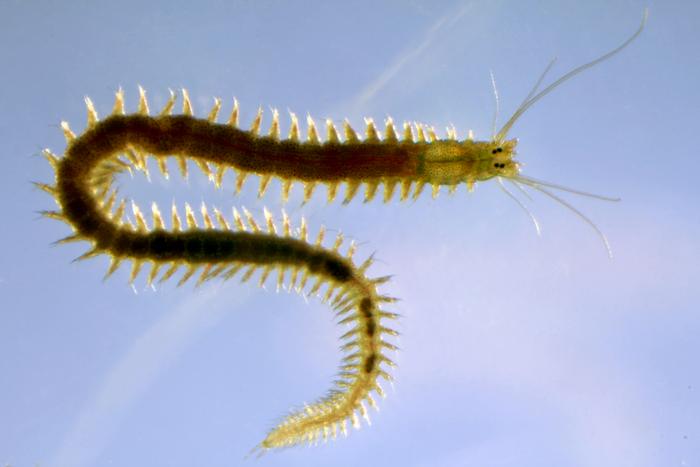The sea worm Platynereis dumerilii is only a few centimetres long but has a remarkable ability: in just a few days, it can regenerate entire parts of its body after an injury or amputation. By focusing more specifically on the mechanisms at play in the regeneration of this worm’s tail, a research team led by a CNRS scientist1 has observed that gut cells play a role in the regeneration of the intestine as well as other tissues such as muscle and epidermis. Even more surprising, the team found that this ability of gut cells to regenerate other tissue varies according to their location: the closer they are to the posterior end of the worm, the greater the variety of cell types they can rebuild2. This study will appear in Development on 2 July.

Credit: © Dr. Pierre Kerner, Institut Jacques Monod
The sea worm Platynereis dumerilii is only a few centimetres long but has a remarkable ability: in just a few days, it can regenerate entire parts of its body after an injury or amputation. By focusing more specifically on the mechanisms at play in the regeneration of this worm’s tail, a research team led by a CNRS scientist1 has observed that gut cells play a role in the regeneration of the intestine as well as other tissues such as muscle and epidermis. Even more surprising, the team found that this ability of gut cells to regenerate other tissue varies according to their location: the closer they are to the posterior end of the worm, the greater the variety of cell types they can rebuild2. This study will appear in Development on 2 July.
Scientists carried out these observations by monitoring the outcome of gut cells and proliferative cells that form close to the amputated end of the worm. This was tracked using different markers in particular by fluorescent beads ingested by the worms. Annelids, or ‘segmented worms’, which have only been studied in the last 20 years, are an ideal model for the study of regeneration, a process that is widespread in animals but still mysterious for scientists.
The research team will continue this work to determine whether cell types, other than gut cells, can play a role in regenerating a variety of cell types.
Notes
1 – Working at the Institut Jacques Monod (CNRS/Université Paris Cité). Scientists at Inserm and Université Paris Cité also contributed to this research.
2 – Only cells involved in the nervous system and growth zone of the worm (a ring of stem cells involved in the continuous growth of the animal until it reaches sexual maturity) cannot, it appears, be generated by gut cells found in the posterior end of the worm.
Journal
Development
Article Title
Variations in cell plasticity and proliferation underlie distinct modes of regeneration along the antero-posterior axis in the annelid Platynereis.
Article Publication Date
2-Jul-2024



